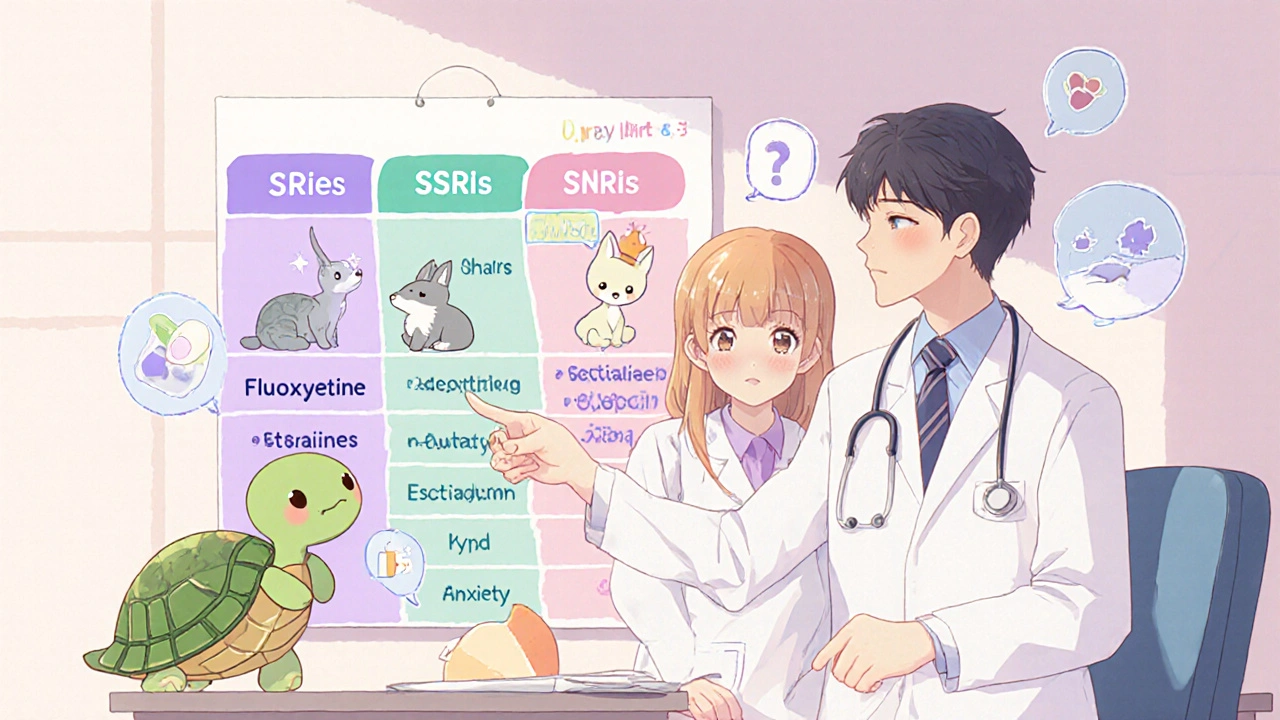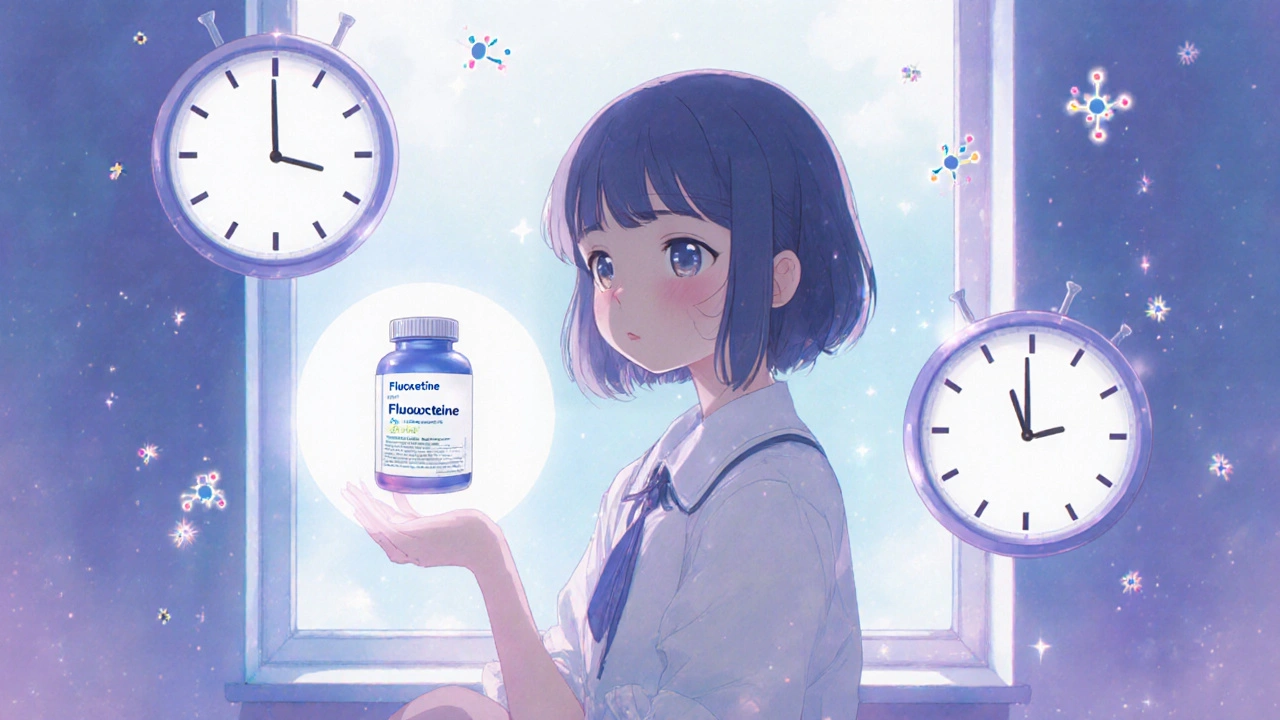Fluoxetine, sold under the brand name Prozac, has been one of the most prescribed antidepressants for over 30 years. But if you’re considering it-or already taking it-you’ve probably wondered: fluoxetine is just one option. Are there better ones? Safer? Faster? More tolerable? The truth is, not all SSRIs are the same, and what works for someone else might not work for you.
How Fluoxetine Actually Works
Fluoxetine is an SSRI-selective serotonin reuptake inhibitor. That means it stops your brain from reabsorbing serotonin too quickly, leaving more of it available to improve mood and reduce anxiety. It’s not a quick fix. Most people start noticing changes after 4 to 6 weeks. Full effects can take up to 12 weeks. Unlike some antidepressants, fluoxetine stays in your system for a long time. Its half-life is about 4 to 6 days, and its active metabolite, norfluoxetine, can last up to 16 days. This means if you miss a dose, you’re less likely to feel withdrawal symptoms. But it also means if you have side effects, they stick around longer.
Why People Look for Alternatives
People switch from fluoxetine for a few clear reasons:
- Side effects like nausea, insomnia, or sexual dysfunction
- It doesn’t seem to help after 8-12 weeks
- They want something that kicks in faster
- They’re taking other meds and need fewer interactions
- They’re pregnant, breastfeeding, or planning to be
Switching isn’t always easy. You can’t just stop fluoxetine cold. Even though it lingers in your body, stopping suddenly can still cause dizziness, brain zaps, or irritability. Always work with your doctor to taper slowly.
Top Alternatives to Fluoxetine
Here are the most common SSRIs and SNRIs prescribed as alternatives-and how they stack up.
| Medication | Class | Half-life | Onset of Action | Common Side Effects | Best For |
|---|---|---|---|---|---|
| Fluoxetine | SSRI | 4-16 days | 4-12 weeks | Nausea, insomnia, weight loss, sexual dysfunction | Long-term use, patients needing stable levels |
| Sertraline (Zoloft) | SSRI | 26 hours | 2-6 weeks | Diarrhea, nausea, drowsiness, sexual dysfunction | Generalized anxiety, OCD, panic disorder |
| Escitalopram (Lexapro) | SSRI | 27-32 hours | 2-4 weeks | Fatigue, dry mouth, mild weight gain | Depression with low energy, anxiety |
| Citalopram (Celexa) | SSRI | 35 hours | 2-6 weeks | Nausea, dizziness, increased heart rate (at high doses) | Mild to moderate depression |
| Venlafaxine (Effexor) | SNRI | 5 hours | 2-4 weeks | High blood pressure, sweating, nausea, withdrawal symptoms | Treatment-resistant depression, severe anxiety |
| Desvenlafaxine (Pristiq) | SNRI | 11 hours | 2-4 weeks | Nausea, dizziness, increased blood pressure | Patients who can’t tolerate venlafaxine |
Let’s break down the top three alternatives most people consider.
Sertraline (Zoloft)
Sertraline is often the first alternative doctors suggest. It’s just as effective as fluoxetine for depression and anxiety, but it’s less likely to cause insomnia. Many patients find it easier to tolerate. It’s also approved for OCD, PTSD, and panic disorder-conditions where fluoxetine works too, but sertraline has more consistent data. The downside? It can cause more diarrhea and gastrointestinal upset, especially early on. If you have a sensitive stomach, this might be a dealbreaker.
Escitalopram (Lexapro)
Escitalopram is the purified form of citalopram. Studies show it may be slightly more effective than fluoxetine for depression, especially in people with low energy or fatigue. It’s also less likely to cause weight loss, which matters if you’re already underweight or struggling with appetite. Side effects are milder overall. Sexual side effects are still common, but less severe than with fluoxetine in some trials. It’s a good middle ground: effective, well-tolerated, and doesn’t linger in your system as long as fluoxetine.
Venlafaxine (Effexor)
If SSRIs like fluoxetine haven’t worked after 3 months, your doctor might suggest venlafaxine. It’s an SNRI, meaning it affects both serotonin and norepinephrine. This dual action can help with fatigue, lack of motivation, and chronic pain-symptoms that often come with depression. It tends to work faster than SSRIs. But it’s not for everyone. It can raise blood pressure, and stopping it suddenly causes worse withdrawal than fluoxetine. You need to monitor your numbers closely. Also, it’s more expensive and often not first-line unless other options fail.

What About Non-SSRIs?
Fluoxetine isn’t the only type of antidepressant. Other classes exist:
- Bupropion (Wellbutrin) - Doesn’t affect serotonin. Better for low energy, smoking cessation, and less sexual side effects. But can increase anxiety or cause seizures in high doses.
- Mirtazapine (Remeron) - Helps with sleep and appetite. Good if you’re underweight or can’t sleep. Can cause weight gain and drowsiness.
- Agomelatine - Works on melatonin and serotonin receptors. Used in Europe and Australia. Helps with sleep and mood. Not available everywhere.
These aren’t direct replacements for fluoxetine, but they’re options if SSRIs aren’t working-or if side effects are too much. Bupropion, for example, is often combined with an SSRI when one drug alone isn’t enough.
What Does the Research Say?
A 2022 meta-analysis of 522 studies involving over 100,000 patients found that escitalopram and sertraline had the best balance of effectiveness and tolerability across all antidepressants. Fluoxetine ranked in the middle-effective, but with more side effects than sertraline and slightly lower patient satisfaction. Venlafaxine was more effective for severe depression, but with higher dropout rates due to side effects.
Another 2023 study in the Journal of Clinical Psychiatry showed that patients switching from fluoxetine to escitalopram reported better sleep and less anxiety within 4 weeks. Those switching to sertraline had fewer GI issues but more fatigue.
Who Should Stay on Fluoxetine?
Fluoxetine isn’t outdated. It still has strong reasons to be your go-to:
- You’re on long-term treatment and stable
- You have OCD or bulimia (fluoxetine is FDA-approved for both)
- You need a medication that won’t cause sudden withdrawal if you miss a dose
- You’re a teenager or young adult (fluoxetine is one of the few SSRIs approved for kids 8+)
- You’ve tried others and they didn’t work
If you’re doing well on fluoxetine-with manageable side effects and real improvement-there’s no reason to switch just because it’s not the "newest." Stability matters more than trends.

When to Consider Switching
Switching makes sense if:
- After 10-12 weeks, you’ve seen less than 25% improvement
- You’re experiencing severe sexual dysfunction or weight loss that affects your quality of life
- You’re planning pregnancy (sertraline and escitalopram are preferred over fluoxetine)
- You’re taking other meds and fluoxetine is causing drug interactions
Never switch on your own. Even if you feel better, stopping or switching too fast can trigger withdrawal or worsen symptoms. Your doctor will likely overlap the old and new meds for 1-2 weeks before fully switching.
Real-Life Examples
Here’s what switching looks like in practice:
- Maria, 34, Durban - Took fluoxetine for 8 months. Improved mood but lost 8 kg and couldn’t sleep. Switched to escitalopram. Gained back 5 kg in 6 weeks. Sleep improved. No more brain zaps.
- David, 41 - Fluoxetine helped his depression but made his anxiety worse. Switched to sertraline. Anxiety dropped. Still gets mild nausea, but he can live with it.
- Leah, 28, planning pregnancy - Stopped fluoxetine 3 months before conception. Started sertraline. Her OB-GYN approved it. No relapse.
Final Thoughts
Fluoxetine isn’t the best antidepressant for everyone-but it’s not the worst either. It’s a solid, reliable tool with a long safety record. But if you’re struggling with side effects or not improving, you’re not failing. You’re just not on the right one yet. Sertraline and escitalopram are often better tolerated. Venlafaxine works for tougher cases. Bupropion helps when fatigue is the main issue.
The goal isn’t to find the "best" drug. It’s to find the one that helps you feel like yourself again-with the fewest side effects and the most consistency. Talk to your doctor. Track your symptoms. Give each option a fair shot. And remember: what works for your friend might not work for you. That’s normal.
Is fluoxetine stronger than other SSRIs?
Fluoxetine isn’t stronger-it’s just longer-lasting. It doesn’t work better than sertraline or escitalopram for most people. Studies show similar effectiveness, but fluoxetine has more side effects and slower clearance from the body. Strength isn’t the issue; tolerability and fit are.
Can I switch from fluoxetine to sertraline on my own?
No. Fluoxetine stays in your system for weeks. Switching without medical supervision can cause serotonin syndrome or severe withdrawal. Always taper slowly under your doctor’s guidance. A typical plan involves reducing fluoxetine while slowly adding sertraline over 2-4 weeks.
Which antidepressant has the least side effects?
Escitalopram and sertraline consistently rank highest in tolerability. They cause fewer sexual side effects, less weight change, and milder GI issues than fluoxetine. Bupropion has almost no sexual side effects but can cause anxiety or insomnia in some people.
How long does it take for a new antidepressant to work after switching?
You’ll usually start noticing changes in 2-4 weeks, but full effects take 6-8 weeks. Because fluoxetine lingers, the new drug may take longer to reach steady levels. Don’t expect instant results. Patience and consistency matter more than speed.
Is it safe to take fluoxetine during pregnancy?
Fluoxetine is classified as Category C in pregnancy-meaning animal studies show risk, but human data is limited. Sertraline and escitalopram are preferred during pregnancy because they have more reassuring safety data. If you’re pregnant or planning to be, talk to your doctor about switching before conception.

Comments (9)
Kevin Stone
October 28, 2025 AT 23:33
Fluoxetine is basically the grandfather of SSRIs and still holds up pretty well. Most people jump ship because they want instant results, but mental health isn’t a TikTok trend. If you’re stable and not losing weight or having sex like a zombie, why mess with it? I’ve seen too many people cycle through meds like they’re collecting Pokémon.
Natalie Eippert
October 30, 2025 AT 14:35
Escitalopram is the real MVP if you ask me. Less brain zaps less weight loss and way less drama. Fluoxetine is overrated and honestly kind of outdated. My cousin was on it for years and ended up in therapy because of the sexual side effects. Just switch already. You’re not saving the world by sticking with Prozac.
kendall miles
October 30, 2025 AT 22:35
Did you know the FDA only approved fluoxetine because of corporate lobbying in the 90s? The real studies were buried. Sertraline and escitalopram are cheaper and safer but the pharma giants don’t want you to know that. They profit off long half-lives because you’re stuck buying it for years. Also watch out for the microchips in the pills they say are for serotonin but really track your mood. I’ve seen the documents.
Gary Fitsimmons
November 1, 2025 AT 04:21
I get it switching meds feels scary but you’re not alone. I was on fluoxetine for a year and felt like a ghost. Switched to sertraline and my energy came back. Not magic but better. Talk to your doc. Don’t give up. You’re worth feeling like yourself again.
Bob Martin
November 2, 2025 AT 17:21
Wow. Someone actually wrote a 2000 word essay on SSRIs and didn’t mention Wellbutrin as the real winner. Bupropion doesn’t kill your libido or make you weep into your oatmeal. It’s like antidepressants but for people who still want to have sex and eat food without crying. Why is this even a debate?
Sage Druce
November 3, 2025 AT 03:20
Everyone deserves to feel like themselves again. If fluoxetine isn’t doing it for you it doesn’t mean you’re broken. It just means your brain needs a different key. Escitalopram sertraline bupropion - they’re all tools. Find the one that fits. And if you’re scared to talk to your doctor I’ve been there too. Just write down your symptoms. Start small. You’ve got this.
Tyler Mofield
November 4, 2025 AT 00:12
It is imperative to underscore that the pharmacokinetic profile of fluoxetine confers a distinct advantage in terms of therapeutic adherence and pharmacodynamic stability vis-à-vis alternative SSRIs and SNRIs. The prolonged half-life of norfluoxetine mitigates the risk of discontinuation syndrome and facilitates a more consistent serotonergic tone. To advocate for abrupt substitution without rigorous pharmacovigilance constitutes a clinically indefensible deviation from evidence-based practice.
Patrick Dwyer
November 5, 2025 AT 17:30
There’s no one-size-fits-all here. Fluoxetine’s long half-life makes it ideal for folks with irregular routines or who struggle with daily adherence. But if you’re young and planning a family sertraline is the gold standard. For chronic fatigue or pain comorbidity venlafaxine has its place. The key is matching the drug to the person not the other way around. Talk to your prescriber. Bring your data. Be your own advocate.
Bart Capoen
November 7, 2025 AT 17:02
just switched from fluoxetine to escitalopram 3 weeks ago. no more brain zaps. sleeping better. still a little tired but way less anxious. also no more weight loss which is nice. took me 6 months to finally do it bc i thought i had to suffer through it. turns out i didnt. just talk to your doc. no shame.